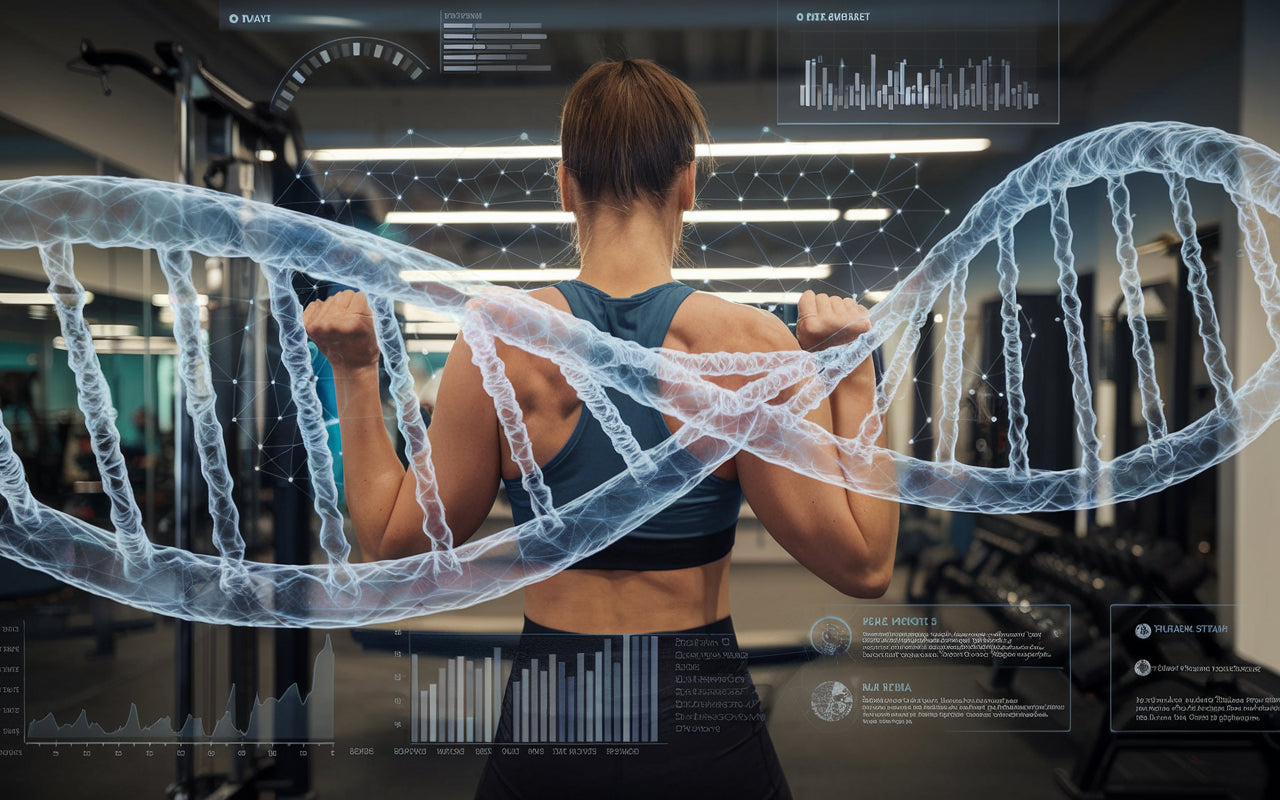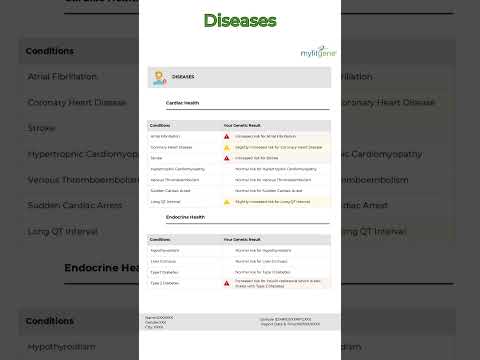स्वास्थ्य और फिटनेस की दुनिया में, वैयक्तिकरण सिर्फ़ एक चलन से ज़्यादा बन गया है - यह एक ज़रूरत बन गया है। अनगिनत कसरत कार्यक्रम, आहार योजनाएँ और फिटनेस रणनीतियाँ उपलब्ध होने के कारण, आपके शरीर के लिए सबसे अच्छा काम करने वाली चीज़ खोजने की कोशिश करते समय अभिभूत होना आसान है। फिटनेस के लिए जेनेटिक परीक्षण की अवधारणा में प्रवेश करें - एक अभूतपूर्व दृष्टिकोण जो आपके वर्कआउट रूटीन को आपके अद्वितीय जेनेटिक मेकअप के अनुरूप बनाता है। यह समझकर कि आपका शरीर जेनेटिक स्तर पर व्यायाम के प्रति कैसे प्रतिक्रिया करता है, आप अपनी फिटनेस योजना को अनुकूलित कर सकते हैं और परिणामों को अधिकतम कर सकते हैं। इस ब्लॉग में, हम इस बात पर गहराई से चर्चा करेंगे कि डीएनए फिटनेस परीक्षण कैसे काम करते हैं, व्यक्तिगत फिटनेस कार्यक्रमों के लाभ और आपके फिटनेस लक्ष्यों तक पहुँचने में जेनेटिक्स महत्वपूर्ण भूमिका क्यों निभाते हैं।
आनुवंशिकी आपकी फिटनेस को कैसे प्रभावित करती है
आपके जीन बिल्डिंग ब्लॉक हैं जो आपकी आंखों के रंग से लेकर आपके मेटाबोलिज्म तक सब कुछ निर्धारित करते हैं। फिटनेस में, कुछ जीन इस बात को प्रभावित करते हैं कि आपका शरीर विभिन्न प्रकार के व्यायामों पर कैसे प्रतिक्रिया करता है, आप कितनी जल्दी ठीक हो जाते हैं, और यहाँ तक कि आपको चोट लगने का कितना खतरा है। आनुवंशिक परीक्षण इन कारकों को प्रभावित करने वाले आनुवंशिक विविधताओं के बारे में जानकारी प्रदान करता है, जिससे आप अपने शरीर की प्राकृतिक क्षमताओं और सीमाओं के आधार पर अपनी फिटनेस दिनचर्या को अनुकूलित कर सकते हैं।
यहां कुछ प्रमुख क्षेत्र दिए गए हैं जहां आनुवांशिकी फिटनेस को प्रभावित करती है:
-
मांसपेशियों की संरचना : कुछ लोगों में आनुवंशिक रूप से धीमी गति से हिलने वाली मांसपेशी फाइबर अधिक होती है, जो दौड़ने या साइकिल चलाने जैसी धीरज वाली गतिविधियों के लिए बेहतर होती है। दूसरों में अधिक तेज़-झटके वाले फाइबर होते हैं, जो उन्हें स्वाभाविक रूप से मजबूत बनाते हैं और भारोत्तोलन या स्प्रिंटिंग जैसी गतिविधियों में बेहतर होते हैं।
-
VO2 अधिकतम : आपका अधिकतम ऑक्सीजन सेवन (VO2 अधिकतम) हृदय संबंधी फिटनेस का एक प्रमुख संकेतक है। कुछ आनुवंशिक भिन्नताएं इस बात को प्रभावित करती हैं कि व्यायाम के दौरान आपका शरीर कितनी कुशलता से ऑक्सीजन का उपयोग करता है, जो आपकी सहनशक्ति और धीरज के स्तर को निर्धारित कर सकता है।
-
लैक्टेट थ्रेशोल्ड : यह व्यायाम के दौरान वह बिंदु है जब लैक्टिक एसिड आपकी मांसपेशियों में बनता है, जिससे थकान होती है। आनुवंशिक परीक्षण से पता लगाया जा सकता है कि आपका शरीर लैक्टेट को कैसे संसाधित करता है और क्या आप स्वाभाविक रूप से दूसरों की तुलना में जल्दी या बाद में थकान के लिए प्रवण हैं।
-
चयापचय : जीन इस बात को भी प्रभावित करते हैं कि आपका शरीर वसा, कार्बोहाइड्रेट और प्रोटीन का चयापचय कैसे करता है। यह जानकारी जानने से आपको अपने वर्कआउट को अधिक प्रभावी ढंग से ईंधन देने और अपने प्रदर्शन को बेहतर बनाने के लिए अपने आहार को समायोजित करने में मदद मिल सकती है।
-
चोट लगने का जोखिम : कुछ लोगों को आनुवंशिक कारणों से टेंडोनाइटिस, स्ट्रेस फ्रैक्चर या लिगामेंट टियर जैसी चोटों का खतरा अधिक होता है। चोट लगने के प्रति अपनी आनुवंशिक संवेदनशीलता को समझने से आपको निवारक उपाय करने में मदद मिल सकती है, जैसे कि कमजोर क्षेत्रों को मजबूत करने के लिए विशिष्ट व्यायाम शामिल करना।
डीएनए फिटनेस टेस्ट क्या है?
डीएनए फिटनेस टेस्ट में शारीरिक फिटनेस से संबंधित विशिष्ट जीन का विश्लेषण करने के लिए आपके लार या आपके गाल से एक स्वाब का नमूना एकत्र करना शामिल है। फिर इन जीनों का मूल्यांकन आपके आनुवंशिक प्रोफ़ाइल के आधार पर व्यायाम, आहार और रिकवरी रणनीतियों पर व्यक्तिगत सिफारिशें प्रदान करने के लिए किया जाता है। परीक्षण के परिणाम आपको बता सकते हैं कि क्या आप धीरज या शक्ति प्रशिक्षण के लिए बेहतर अनुकूल हैं, आपका शरीर व्यायाम से कितनी तेजी से ठीक होता है, और आपके शरीर को अपने सर्वोत्तम कार्य करने के लिए किन पोषक तत्वों की आवश्यकता है।
डीएनए फिटनेस परीक्षण से प्राप्त कुछ सामान्य जानकारियां इस प्रकार हैं:
- एरोबिक क्षमता : व्यायाम के दौरान आपका शरीर कितनी कुशलता से ऑक्सीजन का उपयोग करता है।
- मांसपेशी फाइबर का प्रकार : क्या आपमें धीरज या शक्ति-आधारित गतिविधियों के लिए पूर्ववृत्ति है।
- रिकवरी समय : तीव्र वर्कआउट से उबरने की आपकी आनुवंशिक क्षमता।
- पोषण संबंधी आवश्यकताएं : प्रदर्शन को बढ़ाने के लिए व्यक्तिगत आहार संबंधी सिफारिशें।
- चोट लगने का जोखिम : आनुवंशिक चिह्न जो चोट लगने की अधिक संभावना का संकेत दे सकते हैं।
व्यक्तिगत फिटनेस कार्यक्रमों के लाभ
डीएनए-आधारित फिटनेस योजना के साथ, आप पारंपरिक "एक आकार सभी के लिए उपयुक्त" कसरत कार्यक्रमों से दूर हो जाते हैं। इसके बजाय, आप एक अनुकूलित दृष्टिकोण अपनाते हैं जो आपकी आनुवंशिक शक्तियों और कमजोरियों को ध्यान में रखता है। यहाँ कुछ प्रमुख लाभ दिए गए हैं:
-
दक्षता को अधिकतम करें एक डीएनए फिटनेस टेस्ट आपको बता सकता है कि आपका शरीर लंबी दूरी की दौड़ जैसे धीरज वाले व्यायामों या भारोत्तोलन जैसे शक्ति-आधारित व्यायामों के लिए बेहतर अनुकूल है या नहीं। इस जानकारी से लैस होकर, आप उन प्रकार के वर्कआउट पर ध्यान केंद्रित कर सकते हैं जो आपके शरीर के लिए सबसे प्रभावी हैं, समय की बचत करते हैं और परिणामों को अधिकतम करते हैं।
-
तेजी से रिकवरी जेनेटिक परीक्षण से पता चल सकता है कि आपका शरीर ज़ोरदार गतिविधि से कितनी अच्छी तरह से ठीक हो जाता है। उदाहरण के लिए, धीमी रिकवरी के लिए आनुवंशिक प्रवृत्ति वाले लोगों को गहन वर्कआउट के बीच अधिक आराम के दिनों की आवश्यकता हो सकती है या उन्हें कोल्ड थेरेपी या स्ट्रेचिंग रूटीन जैसी कुछ रिकवरी तकनीकों से लाभ हो सकता है। दूसरी ओर, यदि आपकी आनुवंशिकी से पता चलता है कि आप जल्दी ठीक हो जाते हैं, तो आप अपने वर्कआउट के दौरान अधिक मेहनत और अधिक बार जोर लगा सकते हैं।
-
व्यक्तिगत पोषण आपके जीन भी प्रभावित करते हैं कि आपका शरीर वसा, प्रोटीन और कार्बोहाइड्रेट जैसे मैक्रोन्यूट्रिएंट्स को कैसे संसाधित करता है। उदाहरण के लिए, आप पा सकते हैं कि आपका शरीर आनुवंशिक रूप से कार्बोहाइड्रेट को अधिक कुशलता से संसाधित करने के लिए तैयार है, जो आपके लिए उच्च-कार्ब आहार को आदर्श बनाता है। वैकल्पिक रूप से, आपका शरीर अधिक वसा के सेवन पर पनप सकता है, खासकर यदि आप आनुवंशिक रूप से व्यायाम के दौरान ईंधन के लिए वसा जलाने के लिए इच्छुक हैं। अपने आहार को अपने डीएनए के अनुरूप बनाना आपके प्रदर्शन और ऊर्जा के स्तर को काफी हद तक बढ़ा सकता है।
-
चोट की रोकथाम यदि आपके डीएनए फिटनेस टेस्ट से पता चलता है कि आपको कुछ चोटों का अधिक जोखिम है, तो आप उन क्षेत्रों को मजबूत करने और चोट की संभावना को कम करने के लिए पहले से ही कदम उठा सकते हैं। उदाहरण के लिए, यदि आपको लिगामेंट संबंधी समस्याएं होने की संभावना है, तो आस-पास की मांसपेशियों के लिए लचीलेपन के व्यायाम और शक्ति प्रशिक्षण को शामिल करने से भविष्य में चोटों को रोकने में मदद मिल सकती है।
-
दीर्घकालिक लक्ष्य प्राप्त करें आपके आनुवंशिकी के आधार पर व्यक्तिगत फिटनेस कार्यक्रम स्वास्थ्य और फिटनेस के लिए दीर्घकालिक दृष्टिकोण प्रदान करते हैं। अपने शरीर की प्राकृतिक क्षमताओं और सीमाओं के साथ काम करके, आप एक स्थायी फिटनेस योजना बना सकते हैं जो आपके लक्ष्यों के साथ संरेखित होती है और बर्नआउट या चोट के जोखिम को कम करती है। चाहे आपका लक्ष्य मांसपेशियों का निर्माण करना हो, धीरज में सुधार करना हो या स्वस्थ वजन बनाए रखना हो, आपका डीएनए स्थायी सफलता के लिए खाका प्रदान कर सकता है।
फिटनेस के लिए जेनेटिक परीक्षण का उपयोग कैसे करें
एक बार जब आप DNA फिटनेस टेस्ट ले लेते हैं और अपने परिणाम प्राप्त कर लेते हैं, तो आप अपने फिटनेस रूटीन में निष्कर्षों को लागू करना शुरू कर सकते हैं। यहाँ बताया गया है कि आप अपने वर्कआउट को बेहतर बनाने के लिए अपने DNA से प्राप्त जानकारी का उपयोग कैसे कर सकते हैं:
-
धीरज बनाम शक्ति प्रशिक्षण : अपनी मांसपेशी फाइबर संरचना के आधार पर, आप यह तय कर सकते हैं कि शक्ति प्रशिक्षण या धीरज गतिविधियों पर अधिक ध्यान केंद्रित करना है या नहीं। यदि आप धीरज के लिए बेहतर अनुकूल हैं, तो दौड़ना, साइकिल चलाना या तैराकी को प्राथमिकता दें। यदि आपके पास अधिक तेज़-झटके वाले फाइबर हैं, तो भारी वजन उठाएँ और शक्ति-आधारित व्यायाम पर ध्यान केंद्रित करें।
-
रिकवरी ऑप्टिमाइजेशन : यदि आपके परिणाम बताते हैं कि आपको अधिक रिकवरी समय की आवश्यकता है, तो उच्च तीव्रता वाले सत्रों के बीच पर्याप्त आराम का समय निर्धारित करना सुनिश्चित करें। सक्रिय रिकवरी दिनों को शामिल करना, जैसे कि हल्का योग या पैदल चलना, आपको सक्रिय रखते हुए रिकवरी को बेहतर बनाने में भी मदद कर सकता है।
-
पोषण संबंधी समायोजन : अपने आनुवंशिक प्रोफ़ाइल के आधार पर अपने आहार को तैयार करें। यदि आपका शरीर वसा को कुशलतापूर्वक चयापचय करता है, तो अपने आहार में एवोकाडो, नट्स और जैतून के तेल जैसे अधिक स्वस्थ वसा शामिल करें। यदि आप धीमी गति से कार्बोहाइड्रेट चयापचय करते हैं, तो कम ग्लाइसेमिक खाद्य पदार्थों पर ध्यान केंद्रित करें जो आपके रक्त शर्करा को नहीं बढ़ाते हैं।
-
चोट की रोकथाम : ऐसे व्यायाम शामिल करें जो चोट लगने के जोखिम वाले कमज़ोर क्षेत्रों या जोड़ों को लक्षित करते हैं। उदाहरण के लिए, यदि आपको घुटने में चोट लगने की संभावना है, तो घुटने के आस-पास की मांसपेशियों को मज़बूत करें और अपने जोड़ों पर पड़ने वाले प्रभाव को कम करने के लिए लचीलेपन पर काम करें।
क्या आनुवंशिक परीक्षण फिटनेस सफलता की गारंटी देता है?
जबकि फिटनेस के लिए आनुवंशिक परीक्षण मूल्यवान अंतर्दृष्टि प्रदान करता है, यह याद रखना महत्वपूर्ण है कि यह पहेली का सिर्फ एक टुकड़ा है। स्थिरता, प्रेरणा और बाहरी वातावरण जैसे कारक भी फिटनेस सफलता प्राप्त करने में महत्वपूर्ण भूमिका निभाते हैं। आपका डीएनए ढांचा प्रदान करता है, लेकिन आप इसे कैसे लागू करते हैं यह आपके परिणामों को निर्धारित करेगा।
उदाहरण के लिए, भले ही आपके आनुवंशिकी से पता चलता हो कि आप स्वाभाविक रूप से धीरज वाली गतिविधियों की ओर झुकाव रखते हैं, लेकिन जब तक आप धीरज के लिए लगातार प्रशिक्षण नहीं लेते, तब तक आपको परिणाम नहीं दिखेंगे। इसी तरह, अगर आपके आनुवंशिकी से पता चलता है कि आप जल्दी ठीक हो जाते हैं, तो भी आपको ओवरट्रेनिंग से बचने के लिए उचित आराम और रिकवरी प्रोटोकॉल का पालन करना होगा।
निष्कर्ष: डीएनए इनसाइट्स के साथ अपनी फिटनेस को अनुकूलित करें
अपनी फिटनेस दिनचर्या में आनुवंशिक परीक्षण को शामिल करने से आप व्यायाम, रिकवरी और पोषण के प्रति अपने दृष्टिकोण में क्रांतिकारी बदलाव ला सकते हैं। अपनी कसरत योजना को अपने आनुवंशिक मेकअप के साथ जोड़कर, आप तेजी से प्रगति, कम चोटों और अधिक आनंददायक फिटनेस यात्रा की संभावना को अनलॉक करते हैं। चाहे आप एक अनुभवी एथलीट हों या फिटनेस के प्रति उत्साही, डीएनए फिटनेस परीक्षण आपको सूचित निर्णय लेने में मदद कर सकता है जो टिकाऊ, दीर्घकालिक परिणामों की ओर ले जाता है।






















